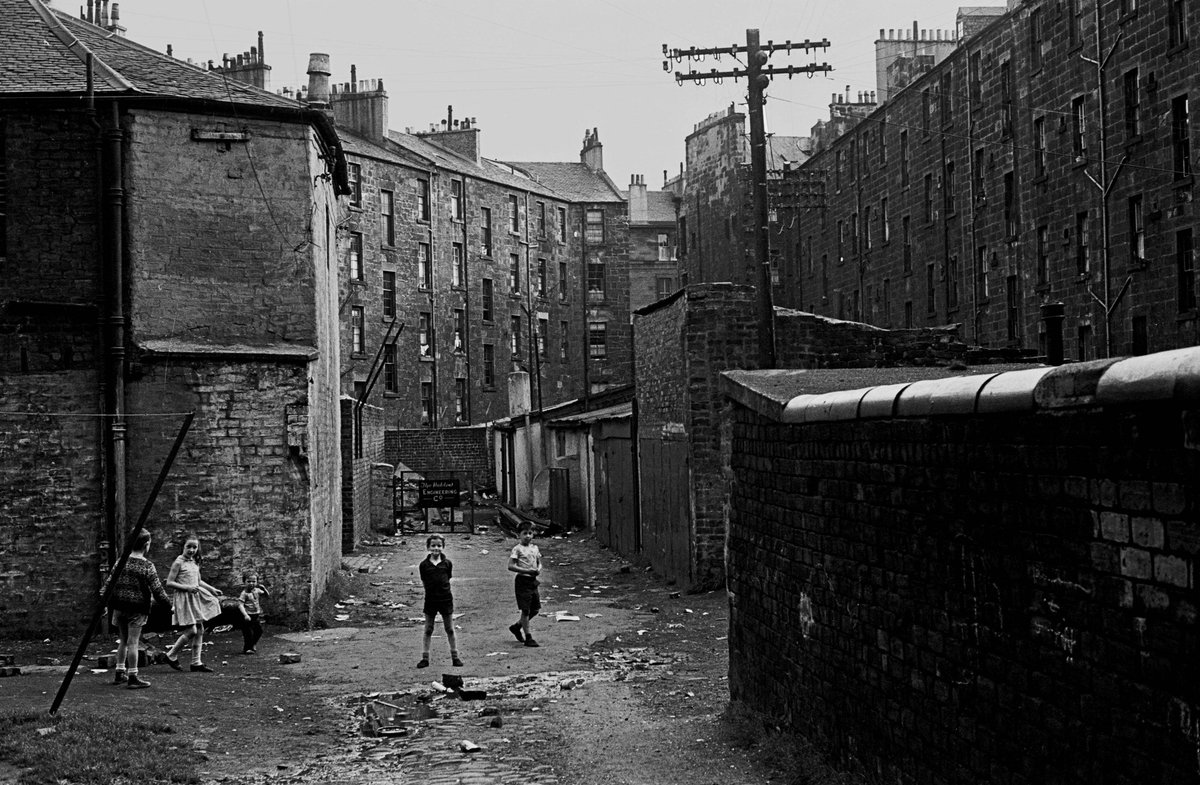According to the census of 1911 three quarters of the Scottish population lived in over-crowded conditions. A comparison with England gives an idea of the appalling state of housing conditions in Scotland: overcrowding in Glasgow was three times more dense than in London and
seven times greater than in Liverpool. In the following text Molly Weir remembers what living conditions were like in a city tenement in the inter-war period.
Molly Weir, Shoes were for Sunday, London: Hutchinson, 1970, p. 88-91.
Molly Weir, Shoes were for Sunday, London: Hutchinson, 1970, p. 88-91.
Although we only had a room and kitchen for the five of us, we never felt overcrowded, for our accommodation was palatial compared with many of the tenement families. There were several large families living in a single room in our neighbourhood, or at best a single room
with a tiny apartment opening out of it, not much bigger than a pantry. This small box-like room was considered a luxury to be envied by those who had to crowd into a single room, and they dreamed of what good use they could put the extra space.
One family in our tenement
One family in our tenement
had fourteen children and they all lived in one room with just this small box-like compartment leading out of it, and once they actually had a wedding reception there when the eldest daughter was married. As the younger children came in from play, they quietly crawled under
the festive table and vanished into the smaller room, where bags of chips were handed through to them, and they boasted of this treat for weeks afterwards. Long experience of living in such cramped conditions had trained them to play noiselessly and happily, and they might
have been a family of mice for all the noise they made. Indeed some of the wedding guests never even knew they were there.
In all the years of my childhood, I never knew that family’s mother’s voice raised in anger. And the wedding feast was the only occasion I ever saw
In all the years of my childhood, I never knew that family’s mother’s voice raised in anger. And the wedding feast was the only occasion I ever saw
her without her working apron. On this one glorious night her eyes could be lifted above the level of the kitchen sink, and the bridal pair were waved off in a shower of confetti to their own little single end, which they had miraculously found ten minutes away, so visiting
mother and the thirteen brothers and sisters would be no problem.
Further along the street, another family of fourteen had a room and kitchen like ours, separated by a lobby, and both rooms of equal size. They felt they were so rich in space that they added to their
Further along the street, another family of fourteen had a room and kitchen like ours, separated by a lobby, and both rooms of equal size. They felt they were so rich in space that they added to their
meagre income by taking in a lodger. This was a great source of interest and mystery to me. I’d never heard of a lodger before, and viewed this man as somebody very special. He was on constant night-shift, which meant he slept during the day. None of us saw any thing unusual
in the fact that he surely slept in a bed which was used at night by several of the fourteen other occupants who, of course, slept at the normal time during the night. I thought this a most resourceful arrangement, making a bed earn its keep in this convenient way.
As I was friendly with one of the daughters in this exciting household, I used to pay occasional visits there, and I must have embarrassed the lodger terribly, sitting staring at him with unwinking eye, noting every detail of his appearance, from his thick thatch of red hair
to his heavy-soled tackety boots, careful to overlook nothing in the personality of this strange being, the first lodger I had ever seen.
The common factor to such large households was their quietness. This amazed me. I was too young to realise that where three children
The common factor to such large households was their quietness. This amazed me. I was too young to realise that where three children
could be naturally exuberant, twelve or fourteen just had to be quiet and restrained or anarchy would have prevailed. And it was easy to see how fond they all were of each other. In the house where there were fourteen, the girl I was friendly with told me in all seriousness
that when the oldest son was married they felt the house was empty. They missed him so much, they could hardly bear it. I’d have thought they would have been grateful for a little extra breathing space, but their minds didn’t run that way.
-end-
The photo used above, is from
-end-
The photo used above, is from
the 1970s after oil had been found in Scottish waters.

 Read on Twitter
Read on Twitter


